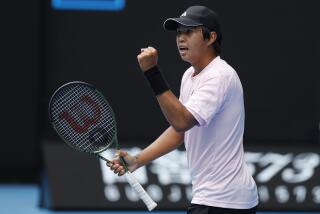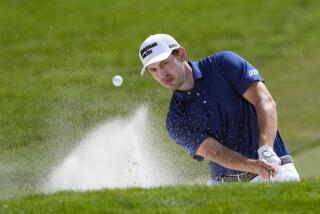31-0 Tennis Record Goes Beyond Words : There’s No Match for the Feats of Pepperdine’s Marty Laurendeau
- Share via
Remarkable may not be a strong enough word to describe Pepperdine tennis player Marty Laurendeau’s performance in dual-match singles this season.
Going into Wednesday’s match at Cal, Laurendeau, a 6-3 third-year sophomore from Montreal, was undefeated, with a 31-0 record.
Unprecedented wouldn’t be the right word either. College players have gone through unbeaten seasons before, and Laurendeau’s coach, Allen Fox, who was the NCAA singles champion as a UCLA senior in 1961, said he was undefeated in singles in his sophomore and junior years and for part of his senior year.
But Fox, whose team has a dual-match record of 28-5 and will play its last match of the season Saturday against defending NCAA champion UCLA, said he is much more impressed with Laurendeau’s performance this season than with his own years ago.
More Matches Now
For one thing, teams played only about 15 matches a year in the 1950s and 1960s, compared to about 30 in recent years. Some unbeaten records listed in UCLA’s press guide (which goes back only to 1967) were nowhere near as long as Laurendeau’s. Some examples: Roy Barth, 8-0 in 1967, and Jun Kuki, 13-0 in 1969, and (of more recent vintage) Jeff Borowiak, 15-0 in 1971, and Peter Fleming, 12-0 in 1976.
Fox, who played on UCLA teams that won NCAA championships in 1960 and 1961, said the competition today is much stronger than it was in his day.
“When I was playing in college, the toughest teams in the nation were either UCLA or USC, and Stanford had a couple of guys,” he said. “Now all teams are quite good. We lost this year to Cal State Long Beach, and all their players are pretty darn good.”
In getting a handle on Laurendeau’s feat, one wouldn’t go very far wrong in relying on the word of Fox, a three-time member of the U. S. Davis Cup team who was ranked among the top 10 U. S. singles players three times and whose Pepperdine teams have been big winners for the past eight years.
Gaining National Notice
Fox’s assessment: Laurendeau has been very tough when the going has been much tougher than it used to be.
His performance has made the Intercollegiate Tennis Coaches Assn. take notice. Before the season, Laurendeau, who began the year as his team’s No. 6 singles player but has moved up to as high as No. 3, was not ranked among the top 100 college players in the United States. But as of last week, he was rated 46th.
Not bad for a non-scholarship player who came to the United States to improve his game because, Laurendeau said, Canadian universities do not have intercollegiate competition.
He said he chose Fox and the Waves because Glenn Michibata, a Toronto native who was a three-time All-American (1981-83) at Pepperdine, had played there. He said he “always looked up to” Michibata, who is playing on the professional tour. “He was the dominant figure in Canada and among the top 10 juniors in the world.”
Impressed by Fox
Laurendeau, Canada’s second-ranked junior before he went to Pepperdine, said he had also been impressed with Fox after he read the coach’s book, “If I’m the Better Player, Why Can’t I Win?”
In the 1983 season, his first year at Pepperdine, Laurendeau said he redshirted because he knew he was not a better player than anyone on that team. It included Michibata, the late John van Nostrand, Rill Baxter, Jerome Jones, Kelly Jones (now a junior) and Richard Gallien, now a Pepperdine assistant coach.
After sitting out 1983, he had an 11-1 record last year, playing mostly at the No. 6 position and a couple of times at No. 5. Nothing to be ashamed of as a debut, but he felt he needed to improve, particularly in the mental aspect of the game, which he feels is about 80% of good tennis.
“Coach Fox told me if I wanted to get better, I would have to improve my self-control. I would start worrying, get fearful when things got tight in a game and not focus on a crucial point. That would affect my performance the next few games, and most of the time that got me into trouble.
“This year I’ve learned to hang in there mentally. If your mind is stable, most of the time your strokes will follow and that will get you out of trouble.”
Some Tough Matches
He has been in a peck of trouble at times during his unbeaten streak. Fox said that at least 10 of his victories were tough ones that went to three sets. But he won all 10, an accomplishment that Fox, who has a Ph.D. in psychology, finds astounding.
“If it’s a 50-50 chance of winning one three-set match,” said Fox, “the probability of winning 10 of them is one-half to the 10th power. That’s astronomical.
“When Marty came here he had a very, very good backhand and was physically strong. Since then he has learned how to hit a good forehand and to volley and to stay in matches longer.
“When he came into a match, however, he was not very high mentally, and he used to get disenchanted and easily depressed when things would go badly. But he’s a good student who listens and is very coachable.
“Most people can’t concentrate for an entire match, and so they make mistakes. Marty can concentrate for hours, and he works. He’s the hardest worker on the team, and that’s been a positive influence on the team. They respect him, and his winning gives everybody hope that what they do in practice works, because they see his advancement.”
May Get Scholarship
Because of his excellent year, Laurendeau is advancing swiftly toward a scholarship, something he feels he needs because of the high cost of tuition and because the Canadian dollar is not as strong as America’s, which makes schooling costlier for a Canadian. Fox said there is a good chance he will get one and that he is “quite close to it.”
His father, Fernand, is a vascular surgeon and a member of the medical faculty at the University of Montreal, and people might consider the Laurendeaus well-to-do. But Marty has two younger brothers (Eric, 18, and Simon, 16) who will probably be going to college, and, as many American and Canadian families know, that is expensive.
If Marty has great powers of concentration on the court, he apparently can focus them on academics as well. He said that, although he was far from fluent in English when he came here because French is his first language, he is a B student at Pepperdine with a double major in psychology and sociology.
If he used to panic when he got behind in a match last year, he said that he now welcomes those tight situations.
Fights When He’s Down
“I like being down in a match; it makes you fight more.”
He said he doesn’t feel he has any major weapons on the court and does not usually play the powerful serve-and-volley game that most American college players employ.
He is used to playing on slow clay surfaces in Canada, rather than hard courts, and he likes to play the waiting game with “a pretty consistent return of service, consistency from the baseline and a good two-handed backhand.
“Mostly, it’s just staying out there and having the other guy work for the match. I’m not the kind of guy to give away free points. The other guy has to work hard to beat me.
“My goal when I go out on the court is to give 100%, no matter what position I play (in singles), and try my hardest to get a point for the team. I just like the idea of being challenged, of coming out strong and performing well.
“But I don’t mind winning easily sometimes.”
More to Read
Go beyond the scoreboard
Get the latest on L.A.'s teams in the daily Sports Report newsletter.
You may occasionally receive promotional content from the Los Angeles Times.






